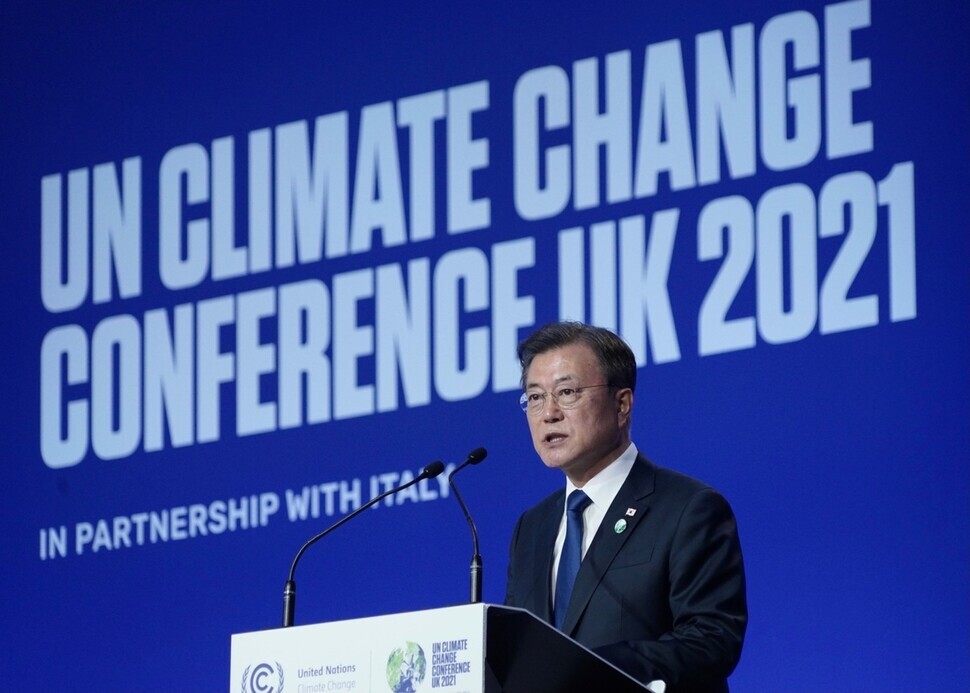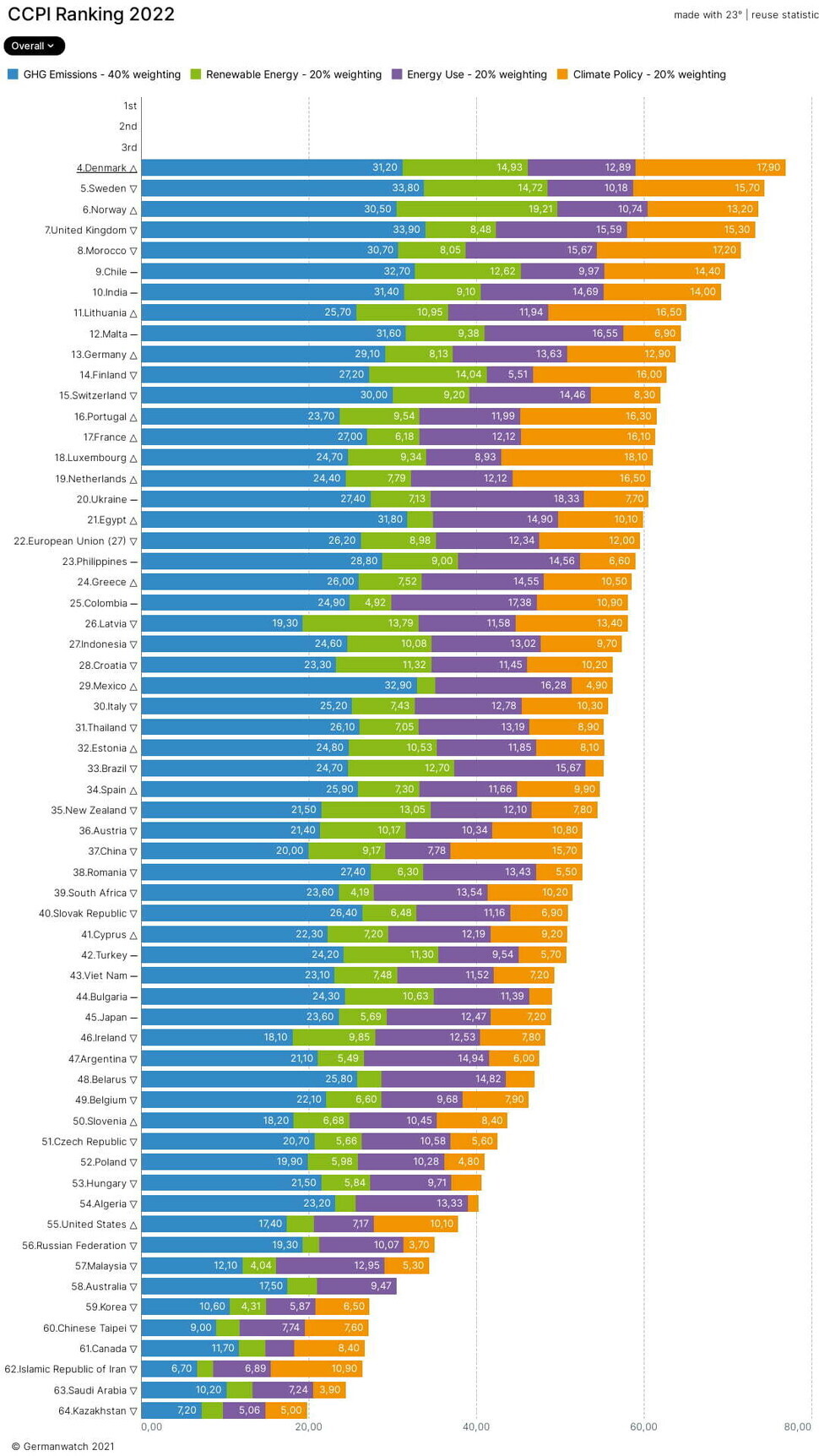hankyoreh
Links to other country sites 다른 나라 사이트 링크
Despite lofty goals and declarations, S. Korea ranks among worst on climate change action

While South Korea has publicly adopted an aggressive posture on tackling climate change — promising to reduce carbon emissions by 40% by 2030 and achieve carbon neutrality by 2050 — it continues to rank near the bottom in terms of climate policy and implementation.
On Tuesday, the 17th Climate Change Performance Index (CCPI) was published by Germanwatch, an international assessment organization, and NewClimate Institute, a climate research organization. The CCPI evaluates the climate policy and implementation level of the European Union and the 60 countries that are responsible for 90% of greenhouse gas emissions around the world.
South Korea ranked No. 59 among the 64 spots on the CCPI chart. The top three spots were left empty because no countries did well enough to merit a “very high” rating. Only five countries were rated lower than Korea: Taiwan, Canada, Iran, Saudi Arabia and Kazakhstan.
Last year, Korea ranked 53rd out of 61. In short, Korea remains at the bottom of this international assessment despite several climate initiatives it has announced this year. The highest-rated countries were Denmark, Sweden, Norway and the UK.

The CCPI is calculated by scoring each country in the four areas of greenhouse gas emissions, renewable energy, energy use and climate policy, then adding up the four scores. Korea scored “very low” in greenhouse gas emissions and energy use and “low” in renewable energy and climate policy.
At a climate summit this past April, President Moon Jae-in announced that Korea would stop investing in overseas coal. The Carbon Neutrality Act took effect in August, creating a legal mandate for reducing greenhouse gas emissions by at least 35% from 2018 levels by 2030. But experts say that’s not enough to keep global temperatures from rising more than 1.5 degrees Celsius (2.7 degrees Fahrenheit) above preindustrial levels, and Korea’s climate policy scored poorly this year, just as last year.
“The fact that Korea still ranks low on the CCPI despite making climate declarations and announcing climate goals several times this year suggests that actual policies to implement those announcements haven’t been very meaningful. The fundamental issues that are impeding the achievement of carbon neutrality need to be identified and addressed,” said Han Ga-hee, a researcher with Solutions for Our Climate.
By Lee Keun-young, senior staff writer
Please direct questions or comments to [english@hani.co.kr]

Editorial・opinion
![[Column] Season 2 of special prosecutor probe may be coming to Korea soon [Column] Season 2 of special prosecutor probe may be coming to Korea soon](https://flexible.img.hani.co.kr/flexible/normal/500/300/imgdb/original/2024/0426/3317141030699447.jpg) [Column] Season 2 of special prosecutor probe may be coming to Korea soon
[Column] Season 2 of special prosecutor probe may be coming to Korea soon![[Column] Park Geun-hye déjà vu in Yoon Suk-yeol [Column] Park Geun-hye déjà vu in Yoon Suk-yeol](https://flexible.img.hani.co.kr/flexible/normal/500/300/imgdb/original/2024/0424/651713945113788.jpg) [Column] Park Geun-hye déjà vu in Yoon Suk-yeol
[Column] Park Geun-hye déjà vu in Yoon Suk-yeol- [Editorial] New weight of N. Korea’s nuclear threats makes dialogue all the more urgent
- [Guest essay] The real reason Korea’s new right wants to dub Rhee a founding father
- [Column] ‘Choson’: Is it time we start referring to N. Korea in its own terms?
- [Editorial] Japan’s rewriting of history with Korea has gone too far
- [Column] The president’s questionable capacity for dialogue
- [Column] Are chaebol firms just pizza pies for families to divvy up as they please?
- [Column] Has Korea, too, crossed the Rubicon on China?
- [Correspondent’s column] In Japan’s alliance with US, echoes of its past alliances with UK
Most viewed articles
- 1After election rout, Yoon’s left with 3 choices for dealing with the opposition
- 2Why Kim Jong-un is scrapping the term ‘Day of the Sun’ and toning down fanfare for predecessors
- 3Two factors that’ll decide if Korea’s economy keeps on its upward trend
- 4Noting shared ‘values,’ Korea hints at passport-free travel with Japan
- 5AI is catching up with humans at a ‘shocking’ rate
- 646% of cases of violence against women in Korea perpetrated by intimate partner, study finds
- 7Why Korea shouldn’t welcome Japan’s newly beefed up defense cooperation with US
- 8‘We must say no’: Seoul defense chief on Korean, USFK involvement in hypothetical Taiwan crisis
- 9[Column] Season 2 of special prosecutor probe may be coming to Korea soon
- 10Fast Food Workers’ Day comes to South Korea